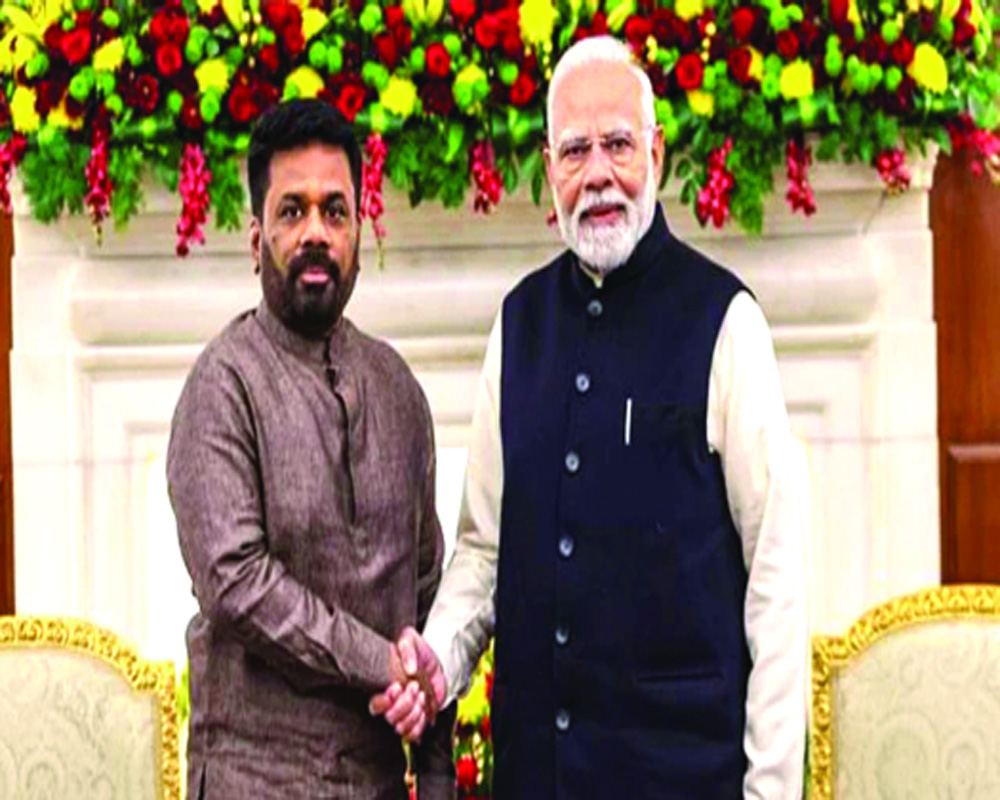Both nations reiterate commitment to defence collaboration and regional stability
India strengthened its ties with its closest maritime neighbor, Sri Lanka, this week, countering the growing influence of China in the island nation. Sri Lanka's President, H.E. Mr. Anura Kumara Dissanayaka, made his first bilateral visit to New Delhi following the recent presidential and parliamentary elections. Earlier this year, President Dissanayaka had also visited Delhi at a time when Sri Lanka’s political future, including the timing of its elections, was still uncertain. The new President came to power riding on the left-leaning party, which is known to have harboured some Anti-Indian sentiments in the past. However, New Delhi chose to bet on the relatively young Marxist leader, hoping for a sense of prudence in future. Disnayaka in the past, has managed to maintain a fine balance in Sri Lanka’s bilateral relations with India and China, not trying to get caught in any crossfire.
Meanwhile, while India’s military tensions with China have de-escalated in the recent past, it still chooses to be cautious. Special Representatives from India and China also met this week in Beijing, to discuss their mutual bilateral relations. It seems that with the Trump administration back in the Oval Office in January, China wants to de-escalate military tensions with countries it considers as rivals. China is aware that Trump is likely to impose tariffs on many of its exports to the US, and perhaps further tighten the transfer of high-end technology from America. It is acutely aware that, India would not join an economic dialogue unless the overarching military issues are sorted.It is against this background, that Sri Lankan President’s visit to India assumes significance. It may be recalled that China had in the past, sent spy ships (which it calls maritime research vehicles) to Sri Lankan waters, which have raised many red flags for the Indian security agencies.
China also controls critical ports in Sri Lanka, which during any military conflict could be used for strategic purposes. Sri Lanka's President is aware of his country’s dependence on China to keep its economy afloat, while, also not trying to disturb the deep bilateral partnership with India. It was heartening for policy watchers in India to note that the Sri Lankan President chose Delhi to be his port of call after getting elected and came out with some emphatic statements, regarding not allowing, their national territory to be used for any anti-India activities. The joint statement released after the President and Indian PM”s meeting read “Recognising shared security interests of India and Sri Lanka, both leaders acknowledged the importance of regular dialogue based on mutual trust and transparency and giving primacy to each other’s security concerns. India is Sri Lanka’s closest maritime neighbour, President Disanayaka reiterated Sri Lanka’s stated position of not permitting its territory to be used in any manner inimical to the security of India and towards regional stability.”
Taking cognisance of India’s security concerns the two nations further reiterated to “Explore the possibility of concluding a framework Agreement on Defence Cooperation; Foster cooperation in hydrography; Provision of defence platforms and assets to augment Sri Lanka’s defence capabilities; Intensify collaboration through joint exercises, maritime surveillance, and defence dialogue and exchanges; Extend assistance to strengthen capabilities of Sri Lanka on disaster mitigation, relief and rehabilitation, including through training, joint exercises and sharing of best practices; and Enhance capacity building and training for Sri Lankan defence forces and conduct tailor-made training programmes, wherever required.” The bedrock of this relationship is India’s generous economic support to Sri Lanka without putting it through non-transparent, self-serving infrastructure loans, which has led to the loss of strategic ports for the island nation.
(The writer is a policy analyst; views are personal)


























